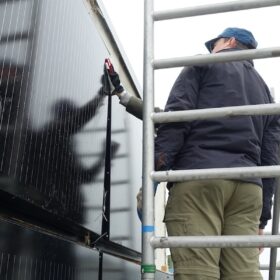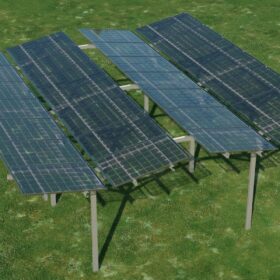Heat pumps in Germany nearly twice as expensive as in UK
RWTH Aachen University conducted the price comparison in cooperation with Octopus Energy. The reasons are significantly different technical and regulatory requirements, but also the funding system.
Austria’s largest battery goes online
The storage facility featuring six Megapack 2XL systems from Tesla was built over a seven-month period in the vicinity of a wood gas generator and a solar farm. The project has a power output of 12 MW and storage capacity of 24 MWh.
Thermal storage beats hydrogen, electrification on industrial costs
A new study in Germany shows the advantages of thermal energy storage in the decarbonization of industrial processes. The researchers noted clear cost advantages and high potential for flexibility in the power grid.
German institutes unveil facade with PV, weather protection, thermal insulation
The Fraunhofer Institute for Solar Energy Systems (Fraunhofer ISE) and the Fraunhofer Institute for Environmental, Safety and Energy Technology (Fraunhofer UMSICHT) say their new facade combines PV modules, weather protection, and thermal insulation. It eliminates the need for a substructure and uses insulation made from sustainable raw materials.
Mercedes-Benz testing new solar paint
Mercedes-Benz said it is now evaluating a 20%-efficient, non-silicon photovoltaic coating that is significantly cheaper than conventional solar modules.
Module power output distortion on rise
A study by German research institute Fraunhofer ISE has revealed a troubling trend. Data shows that modules are increasingly attributed higher power ratings than they actually have. Though the percentages are incremental, it all
adds up.
Germany adds 960 MW of solar in September
Germany installed 960 MW of solar in September, bringing its cumulative PV capacity to more than 94.52 GW.
Scientists investigate potential of diatomite as a raw material for solar cells
A German-Algerian research team has been investigating ways to produce silicon from diatomite, a fossil material containing amorphous silicon dioxide. The researchers said that, for potential solar cell applications, it will be crucial to extract silion with a low level of impurities.
T.Werk unveiles new mounting systems for agrivoltaics
T.Werk has developed two new mounting systems for agrivoltaics, featuring vertical arrays and high-mounted module solutions.
Elastocalorics could replace heat pumps, air conditioning systems
Elastocalorics have the potential to replace current air conditioning and heating systems, offering significant energy savings when paired with technologies such as photovoltaics.









